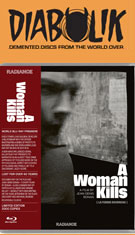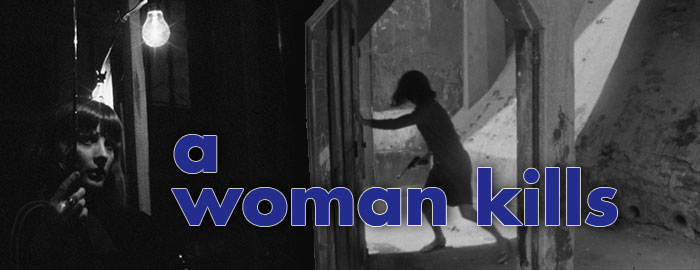B&W, 1968, 68 mins. 46 secs.
Directed by Jean-Denis Bonan
Starring Claude Merlin, Solange Pradel, Myriam Mézières, Jackie Raynal
Radiance Films (Blu-ray) (US/UK R0 HD)
A watershed moment in 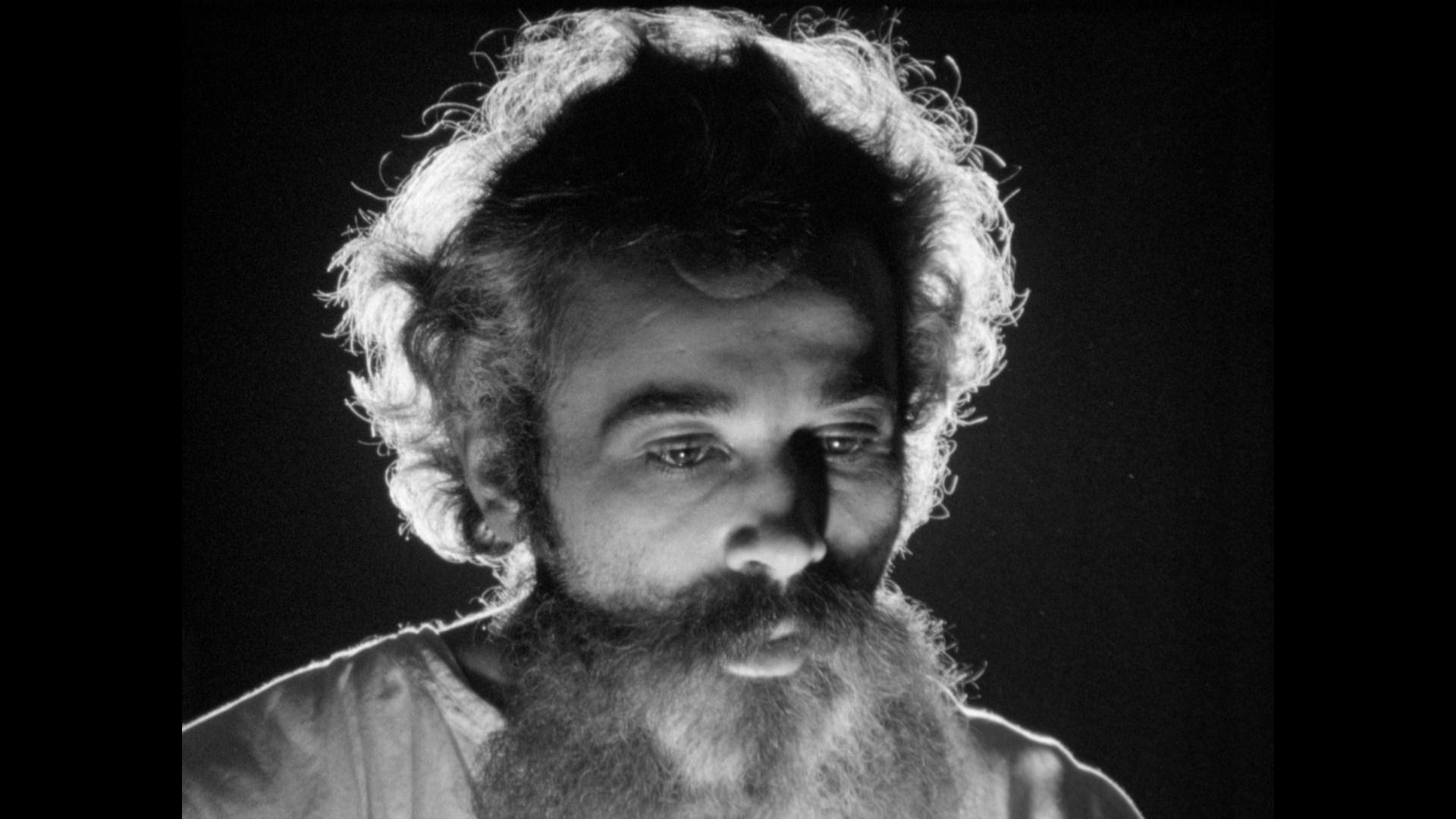 20th-century Parisian history, the civil disobedience, strikes, and economic
20th-century Parisian history, the civil disobedience, strikes, and economic 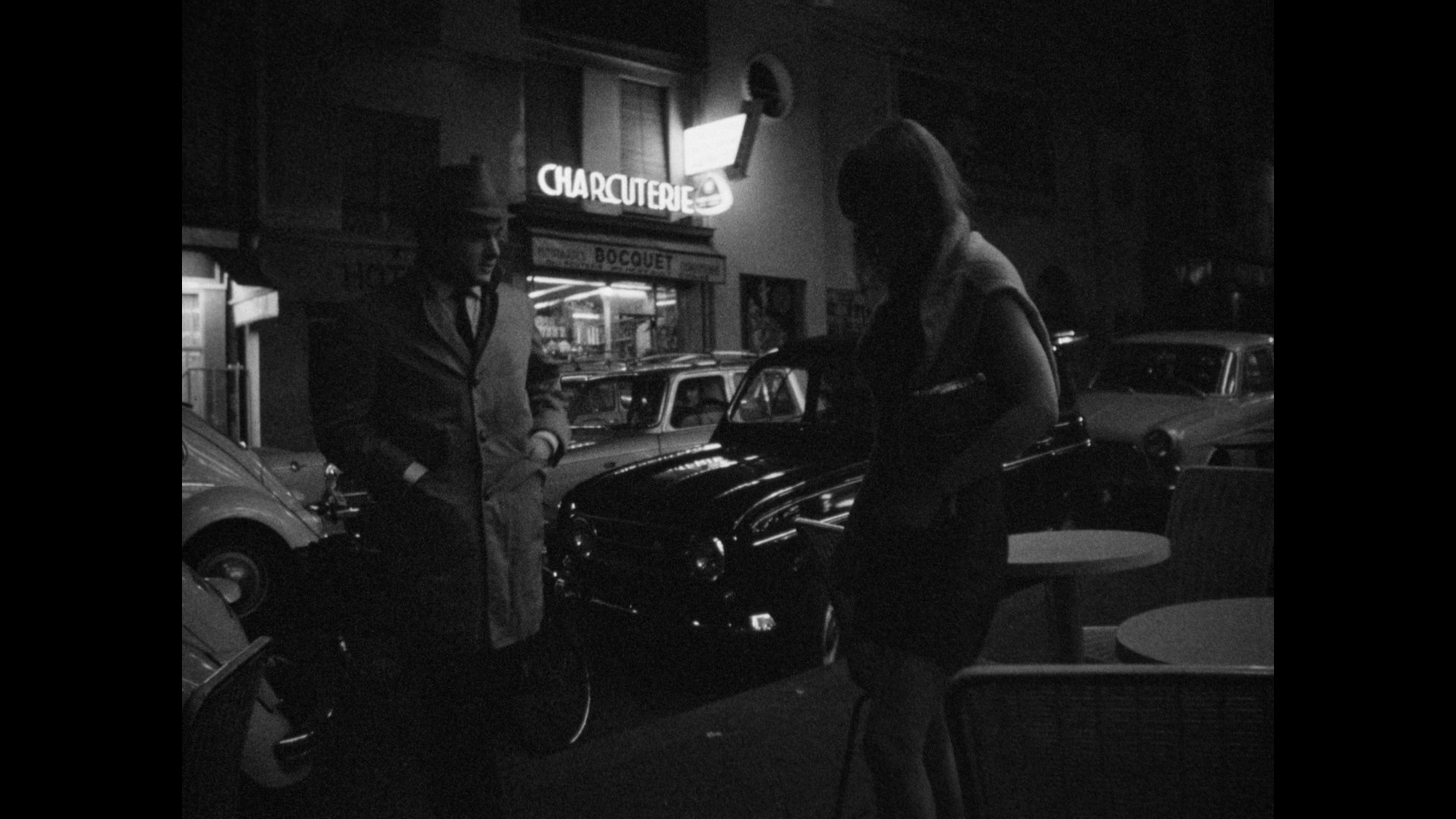 standstill that hit the city for nearly two months in the summer of 1968 ("May 68") had an unavoidable bleed-through into the cinema being made around that time as well. The more obvious immediate examples include François Truffaut's Stolen Kisses, multiple Jean-Luc Godard films, and Claude Lelouch's La vie, l'amour, la mort. One very low-budget production that took full advantage of the city's backdrop at the time, A Woman Kills (La femme bourreau), found a way to use the chaotic streets and unattended rooftops for maximum free production value, but that did little good when it failed to find any kind of distribution and sat around uncompleted on the shelf for decades until it was salvaged and debuted by Luna Park at the Cinémathèque Française in 2010. It marked the first feature for its Tunisian-born director Jean-Denis Bonan, a compatriot of Jean Rollin who already had a handful of short films under his belt (including a scandalous one we'll get to below); despite his misfortune, Bonan kept at it and eventually became a regular director for French television.
standstill that hit the city for nearly two months in the summer of 1968 ("May 68") had an unavoidable bleed-through into the cinema being made around that time as well. The more obvious immediate examples include François Truffaut's Stolen Kisses, multiple Jean-Luc Godard films, and Claude Lelouch's La vie, l'amour, la mort. One very low-budget production that took full advantage of the city's backdrop at the time, A Woman Kills (La femme bourreau), found a way to use the chaotic streets and unattended rooftops for maximum free production value, but that did little good when it failed to find any kind of distribution and sat around uncompleted on the shelf for decades until it was salvaged and debuted by Luna Park at the Cinémathèque Française in 2010. It marked the first feature for its Tunisian-born director Jean-Denis Bonan, a compatriot of Jean Rollin who already had a handful of short films under his belt (including a scandalous one we'll get to below); despite his misfortune, Bonan kept at it and eventually became a regular director for French television.
More of a ragged collage than a traditional narrative, the film opens with audio of news reports about Hélène Picard, a prostitute who was sentenced for 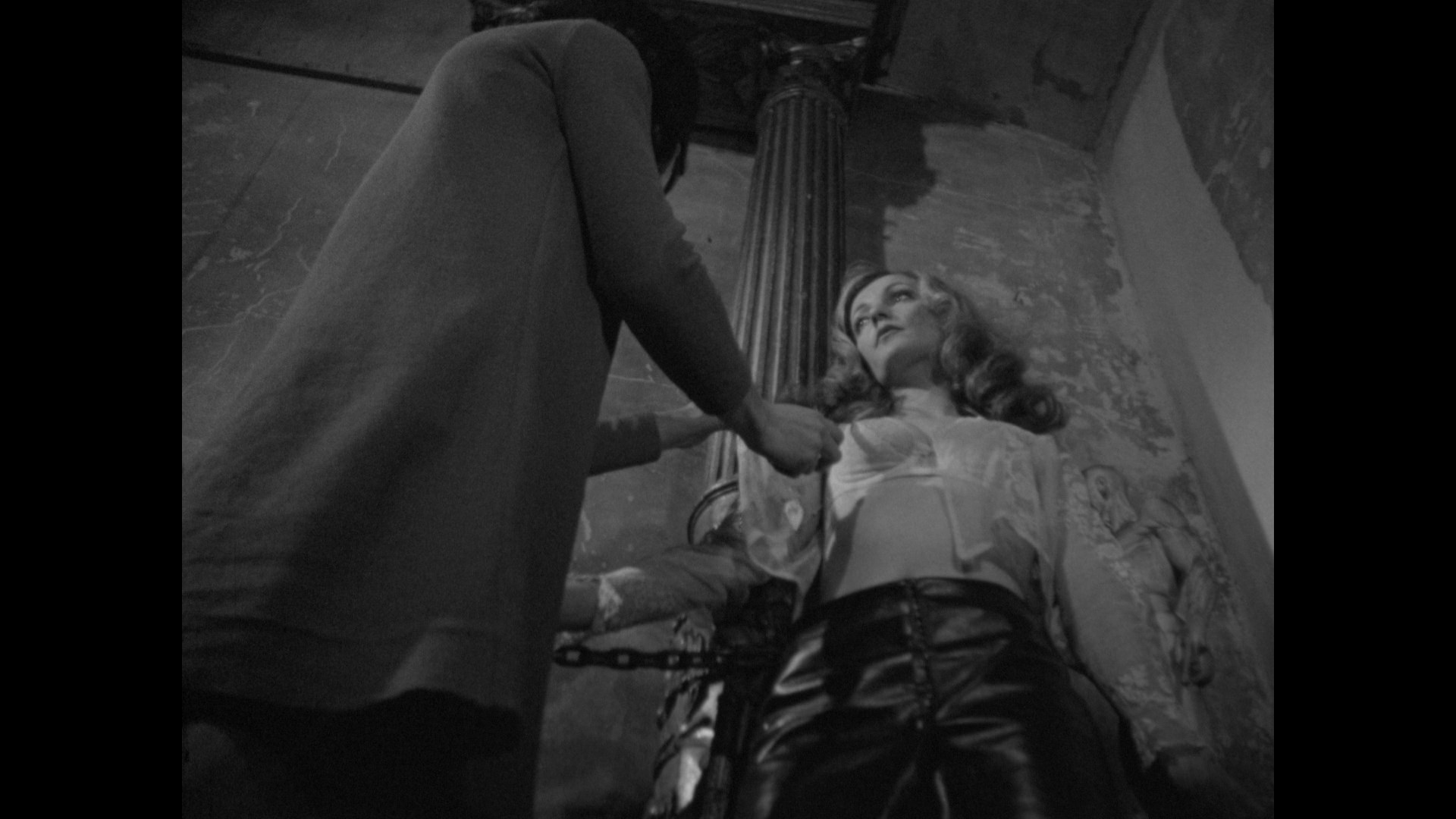 the murders of several coworkers when she was found next to one of the bodies, and a very similar homicide
the murders of several coworkers when she was found next to one of the bodies, and a very similar homicide 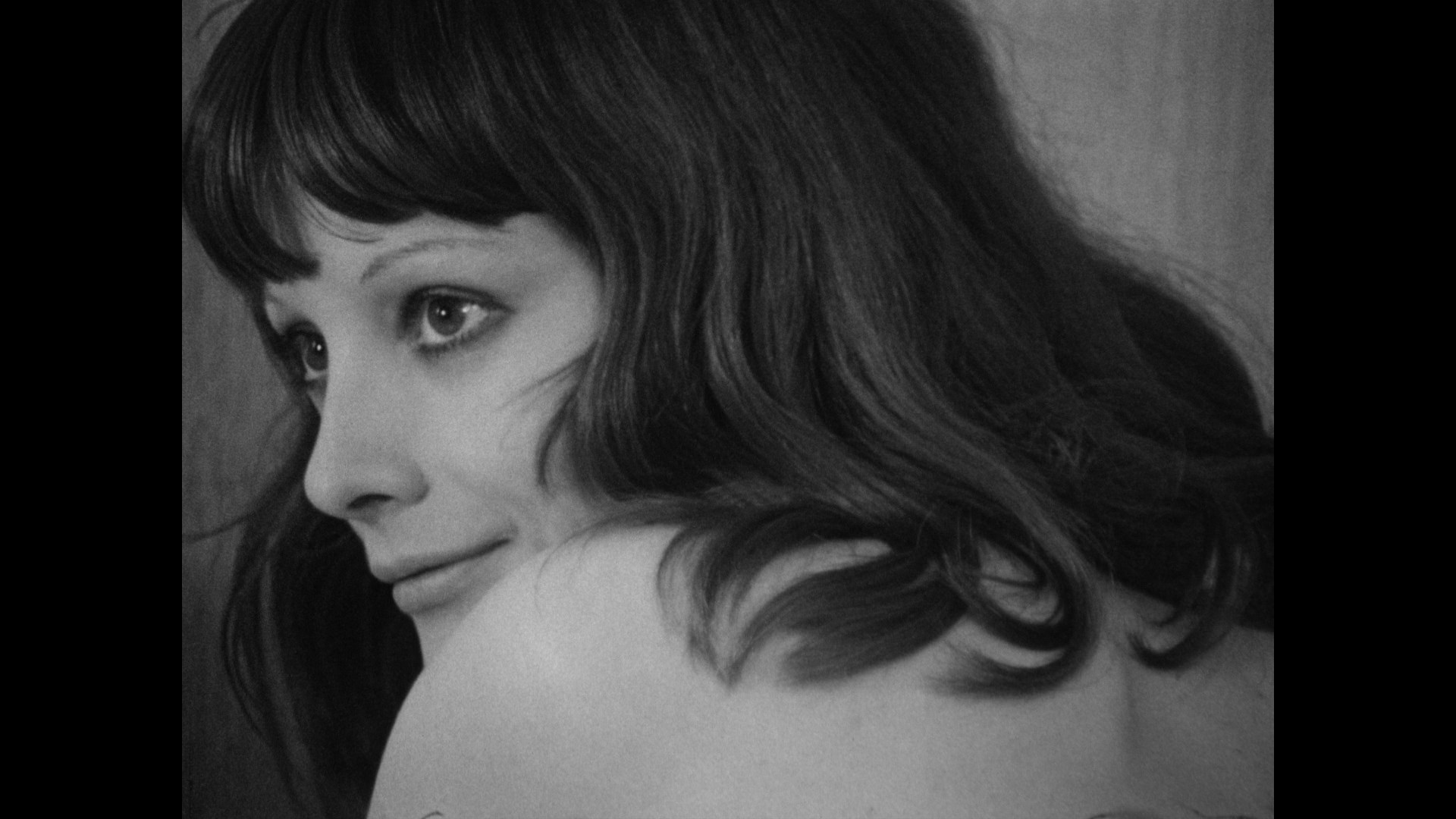 committed two years after her execution. From there we bounce between the women of Pigalle being targeted by the active serial killer sporting long black hair and heels, investigating police officer Solange (The Rape of the Vampire's Pradel), and Louis Guilbot (Merlin), the executioner who dropped the blade on Hélène and now skulks around monologuing about his traumatic past and role as "society's official killer."
committed two years after her execution. From there we bounce between the women of Pigalle being targeted by the active serial killer sporting long black hair and heels, investigating police officer Solange (The Rape of the Vampire's Pradel), and Louis Guilbot (Merlin), the executioner who dropped the blade on Hélène and now skulks around monologuing about his traumatic past and role as "society's official killer."
At least for the the first half, A Woman Kills seems to be a whodunit despite the glaringly obvious nature of its perpetrator; after a point Bonan drops the pretense and turns the film into a manhunt story. Along the way you get odd little digressions involving the past and present killings, but the real star here is Paris itself with tons of great street coverage (that Barbarella display!) and a protracted foot chase that goes through an eye-popping number of alleys and rooftops. It isn't difficult to see why this film couldn't find any takers at the time as it sits somewhere between exploitation and student art project, with the occasional bit of stage blood or brief nudity feeling like concessions to its more oblique fascination with the nature of sanctioned versus unsanctioned killing and the strange relationship between Solange and Louis. It feels very much of the same era as Rollin's earliest work and the more challenging excursions of 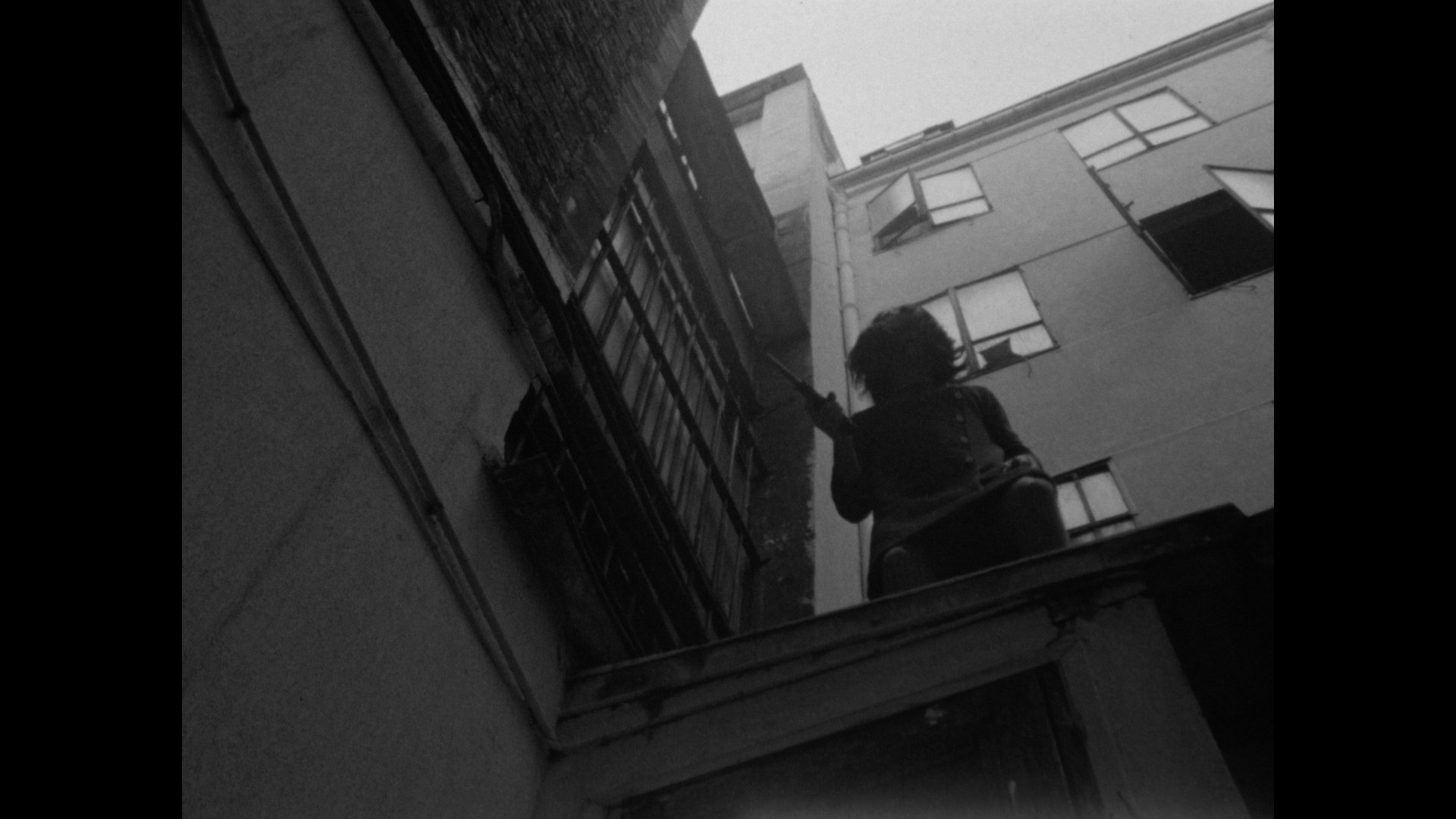 Godard at the end of the
Godard at the end of the 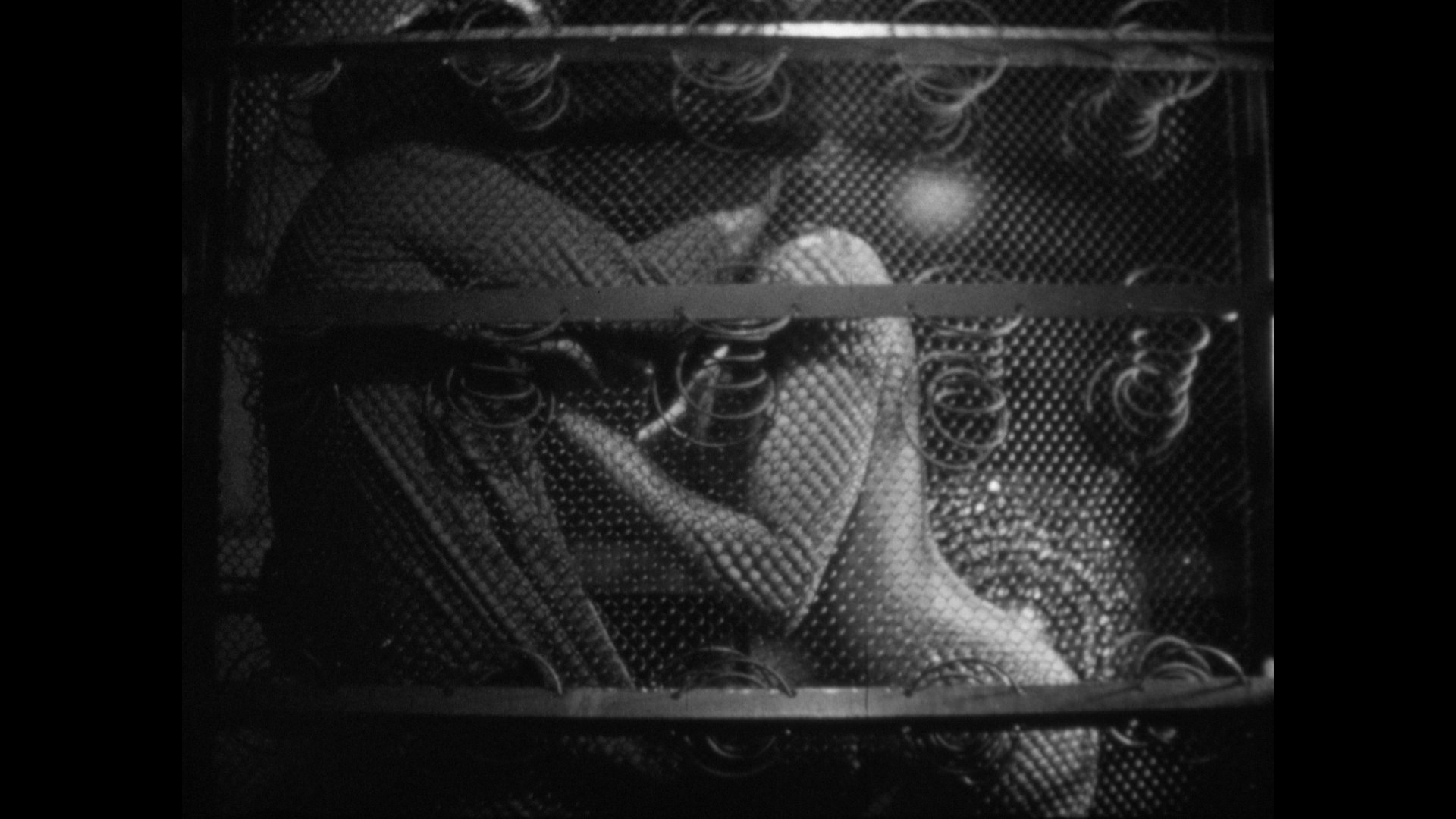 decade, juggling disorienting handheld camerawork with more composed, surreal images like a couple seen below while intertwined on bare mattress springs (which also looks very uncomfortable!).
decade, juggling disorienting handheld camerawork with more composed, surreal images like a couple seen below while intertwined on bare mattress springs (which also looks very uncomfortable!).
One of the inaugural Blu-ray titles in both the U.S. and U.K. from Radiance Films in 2023, A Woman Kills is presented from a 2K restoration of the original 16mm elements as completed by Luna Park (with a very anachronistic font for the new credits). Visually it's a very scruffy film, but the transfer is true to the source with all the grit and grain left intact; detail is pleasing throughout as is the gray scale. The LPCM 1.0 French mono track (with optional English subtitles) is also true to the source and best when showing off the wild jazz score by Bernard Vitet.
Kat Ellinger and Virginie Sélavy (who were both involved in the documentary Orchestrator of Storms: The Fantastique World of Jean Rollin) contribute a very thorough, welcome audio commentary laying out more about the social conditions of 1968, the issue of whether this counts as a genre film, the connections to other serial killer narratives, and the controversial French avant-garde movement flourishing at the time. Sélavy also appears for an optional video intro (4m53s) covering more about the unrest of 1968 from which the film sprang and the other mavericks making waves around the same time. Francis Lecomte's "On the Margin: The Cursed Films of Jean-Denis Bonan" (37m51s) is a new, expanded version of a 2015 documentary short about Bonan with contributions from the director himself, cinematographer Gérard de Battista, editor Mireille Abramovici, musician Daniel Laloux, and actress 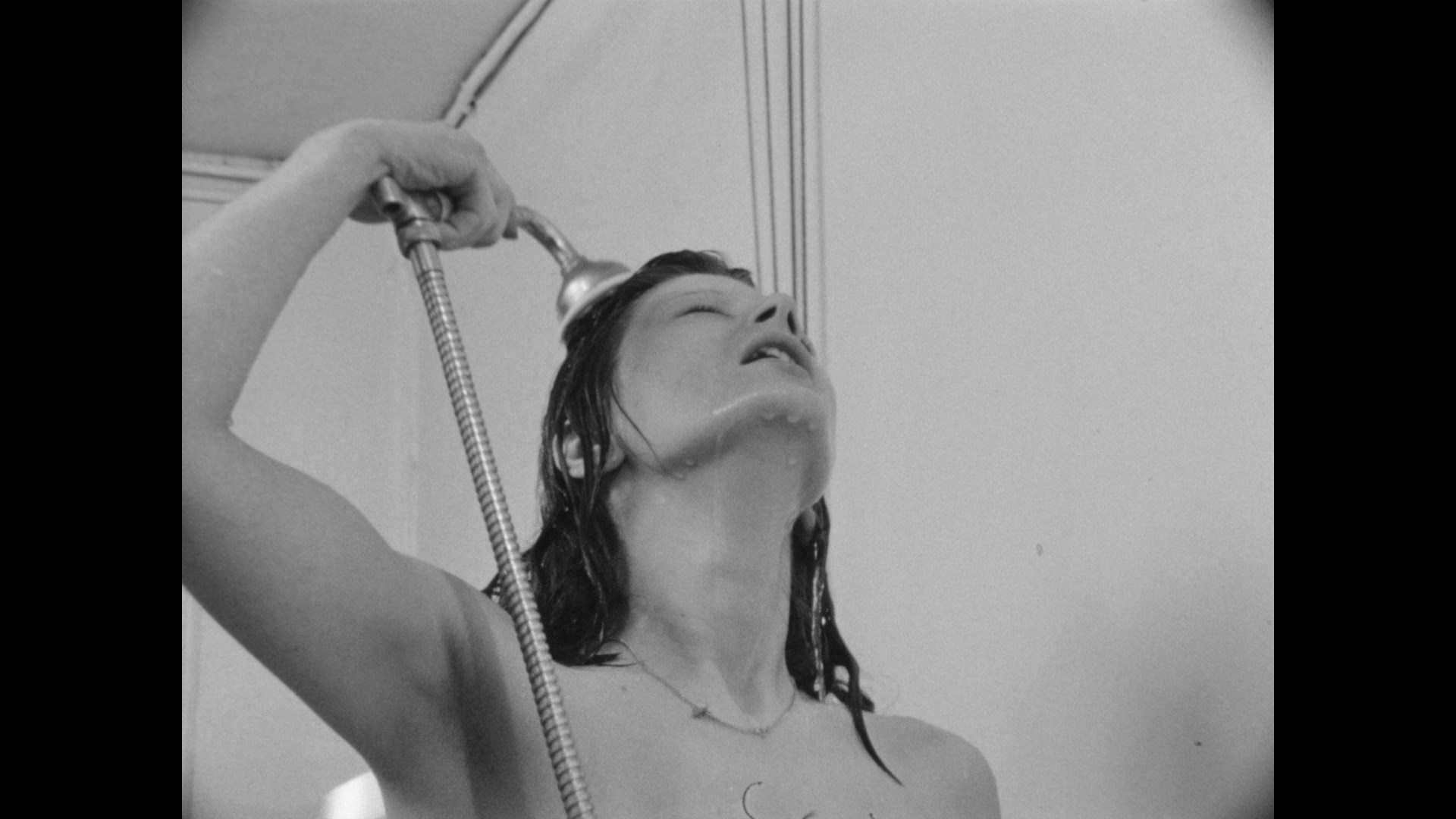 Jackie Rynal chatting about the social mindset of his early works, the collaborative nature of the short films leading up to this feature, and reason so much of it was suppressed by the powers that be or never seen at all. Speaking of which, you also
Jackie Rynal chatting about the social mindset of his early works, the collaborative nature of the short films leading up to this feature, and reason so much of it was suppressed by the powers that be or never seen at all. Speaking of which, you also 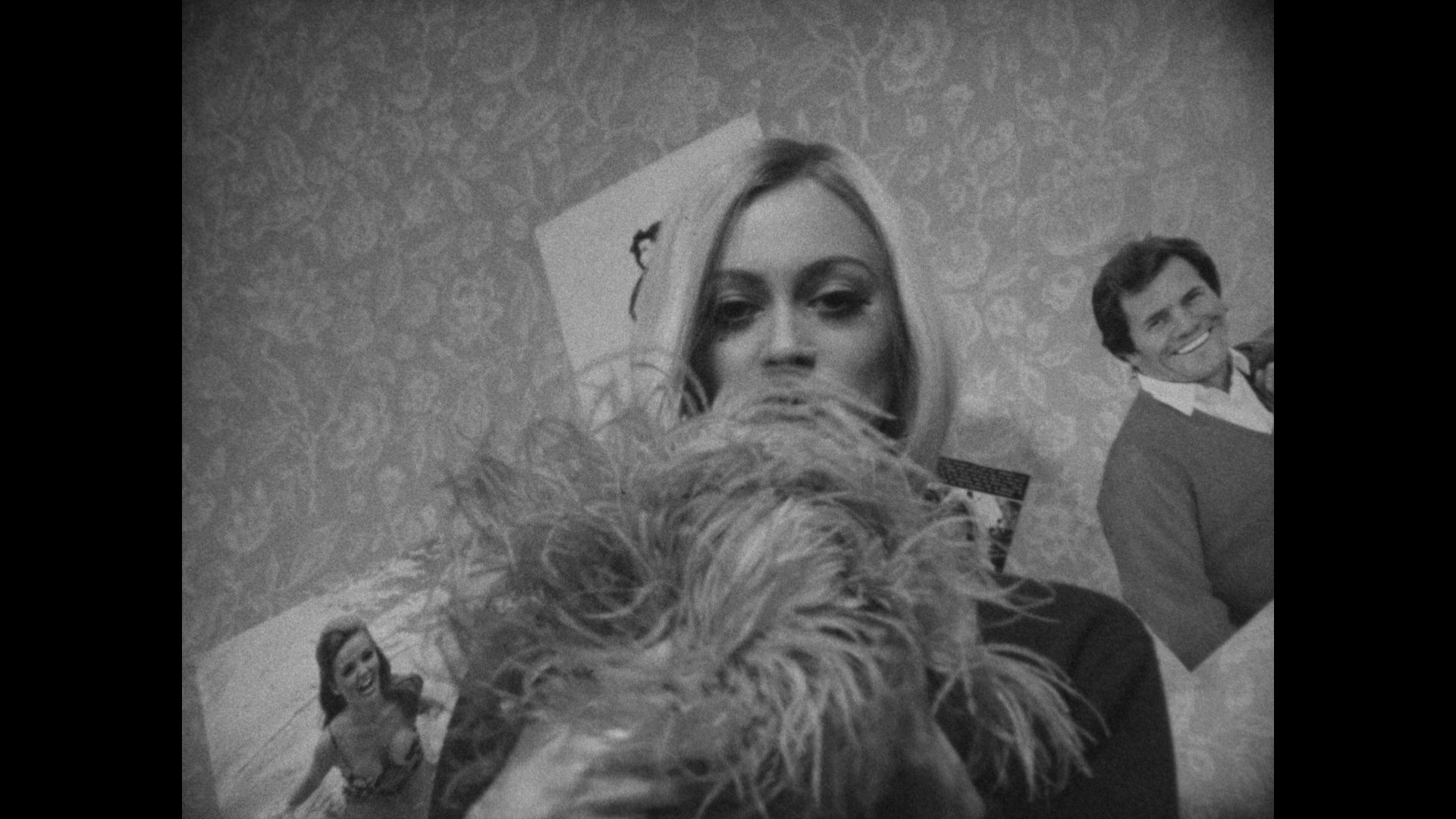 get a heaping of Bonan short works: 1962's The Short Life of Monsieur Meucieu (La vie brève de Monsieur Meucieu) (13m42s), an experimental piece about a man carrying a balancing bar as he goes from a city birth registration office through major life events including love and loss over the course of a day; 1965's A Crime of Love (Un crime d’amour), a collection of lo-res rushes from an unfinished film with the director narrating some context about it; , 1967's Mathieu-fou (17m1s) with Bonan himself and Catherine Deville using regular film, stills, and drawings to illustrate a destructive would-be passion in the woods; and 1967's A Season with Mankind (Une saison chez les hommes) (18m43s), a collage of existing news coverage of various social and religious ceremonies from around the world including Algeria, Senegal, and Tunisia. However, the highlight of these and reason enough to snag this disc by itself is 1966's Sadness of the Anthropophagi (Tristesses des anthropophages (23m38s), a once-banned slice of insanity from Jean Rollin's ABC Films (with Rollin himself getting a collaborator credit) that starts off with two guys in a graveyard talking about the newest big city fad: eating poop, which we see in hilarious Salo-worthy detail at a restaurant. From there it evolves into a satirical comedy about social inequality taken to absurd extremes with a tone that feels like Jodorowsky, Fernando Arrabal, and Lars von Trier going on a bender. If Bonan had ever made a feature film like this, cinema might have imploded on itself. The Luna Park trailer is also included, while the limited edition packaging comes with a new essay about the main feature by Catherine Wheatley, notes by Richard Thomas on the shorts, an interview with French distributor Francis Lecomte, and more.
get a heaping of Bonan short works: 1962's The Short Life of Monsieur Meucieu (La vie brève de Monsieur Meucieu) (13m42s), an experimental piece about a man carrying a balancing bar as he goes from a city birth registration office through major life events including love and loss over the course of a day; 1965's A Crime of Love (Un crime d’amour), a collection of lo-res rushes from an unfinished film with the director narrating some context about it; , 1967's Mathieu-fou (17m1s) with Bonan himself and Catherine Deville using regular film, stills, and drawings to illustrate a destructive would-be passion in the woods; and 1967's A Season with Mankind (Une saison chez les hommes) (18m43s), a collage of existing news coverage of various social and religious ceremonies from around the world including Algeria, Senegal, and Tunisia. However, the highlight of these and reason enough to snag this disc by itself is 1966's Sadness of the Anthropophagi (Tristesses des anthropophages (23m38s), a once-banned slice of insanity from Jean Rollin's ABC Films (with Rollin himself getting a collaborator credit) that starts off with two guys in a graveyard talking about the newest big city fad: eating poop, which we see in hilarious Salo-worthy detail at a restaurant. From there it evolves into a satirical comedy about social inequality taken to absurd extremes with a tone that feels like Jodorowsky, Fernando Arrabal, and Lars von Trier going on a bender. If Bonan had ever made a feature film like this, cinema might have imploded on itself. The Luna Park trailer is also included, while the limited edition packaging comes with a new essay about the main feature by Catherine Wheatley, notes by Richard Thomas on the shorts, an interview with French distributor Francis Lecomte, and more.
 20th-century Parisian history, the civil disobedience, strikes, and economic
20th-century Parisian history, the civil disobedience, strikes, and economic  standstill that hit the city for nearly two months in the summer of 1968 ("May 68") had an unavoidable bleed-through into the cinema being made around that time as well. The more obvious immediate examples include François Truffaut's Stolen Kisses, multiple Jean-Luc Godard films, and Claude Lelouch's La vie, l'amour, la mort. One very low-budget production that took full advantage of the city's backdrop at the time, A Woman Kills (La femme bourreau), found a way to use the chaotic streets and unattended rooftops for maximum free production value, but that did little good when it failed to find any kind of distribution and sat around uncompleted on the shelf for decades until it was salvaged and debuted by Luna Park at the Cinémathèque Française in 2010. It marked the first feature for its Tunisian-born director Jean-Denis Bonan, a compatriot of Jean Rollin who already had a handful of short films under his belt (including a scandalous one we'll get to below); despite his misfortune, Bonan kept at it and eventually became a regular director for French television.
standstill that hit the city for nearly two months in the summer of 1968 ("May 68") had an unavoidable bleed-through into the cinema being made around that time as well. The more obvious immediate examples include François Truffaut's Stolen Kisses, multiple Jean-Luc Godard films, and Claude Lelouch's La vie, l'amour, la mort. One very low-budget production that took full advantage of the city's backdrop at the time, A Woman Kills (La femme bourreau), found a way to use the chaotic streets and unattended rooftops for maximum free production value, but that did little good when it failed to find any kind of distribution and sat around uncompleted on the shelf for decades until it was salvaged and debuted by Luna Park at the Cinémathèque Française in 2010. It marked the first feature for its Tunisian-born director Jean-Denis Bonan, a compatriot of Jean Rollin who already had a handful of short films under his belt (including a scandalous one we'll get to below); despite his misfortune, Bonan kept at it and eventually became a regular director for French television.  the murders of several coworkers when she was found next to one of the bodies, and a very similar homicide
the murders of several coworkers when she was found next to one of the bodies, and a very similar homicide  committed two years after her execution. From there we bounce between the women of Pigalle being targeted by the active serial killer sporting long black hair and heels, investigating police officer Solange (The Rape of the Vampire's Pradel), and Louis Guilbot (Merlin), the executioner who dropped the blade on Hélène and now skulks around monologuing about his traumatic past and role as "society's official killer."
committed two years after her execution. From there we bounce between the women of Pigalle being targeted by the active serial killer sporting long black hair and heels, investigating police officer Solange (The Rape of the Vampire's Pradel), and Louis Guilbot (Merlin), the executioner who dropped the blade on Hélène and now skulks around monologuing about his traumatic past and role as "society's official killer." Godard at the end of the
Godard at the end of the  decade, juggling disorienting handheld camerawork with more composed, surreal images like a couple seen below while intertwined on bare mattress springs (which also looks very uncomfortable!).
decade, juggling disorienting handheld camerawork with more composed, surreal images like a couple seen below while intertwined on bare mattress springs (which also looks very uncomfortable!).  Jackie Rynal chatting about the social mindset of his early works, the collaborative nature of the short films leading up to this feature, and reason so much of it was suppressed by the powers that be or never seen at all. Speaking of which, you also
Jackie Rynal chatting about the social mindset of his early works, the collaborative nature of the short films leading up to this feature, and reason so much of it was suppressed by the powers that be or never seen at all. Speaking of which, you also  get a heaping of Bonan short works: 1962's The Short Life of Monsieur Meucieu (La vie brève de Monsieur Meucieu) (13m42s), an experimental piece about a man carrying a balancing bar as he goes from a city birth registration office through major life events including love and loss over the course of a day; 1965's A Crime of Love (Un crime d’amour), a collection of lo-res rushes from an unfinished film with the director narrating some context about it; , 1967's Mathieu-fou (17m1s) with Bonan himself and Catherine Deville using regular film, stills, and drawings to illustrate a destructive would-be passion in the woods; and 1967's A Season with Mankind (Une saison chez les hommes) (18m43s), a collage of existing news coverage of various social and religious ceremonies from around the world including Algeria, Senegal, and Tunisia. However, the highlight of these and reason enough to snag this disc by itself is 1966's Sadness of the Anthropophagi (Tristesses des anthropophages (23m38s), a once-banned slice of insanity from Jean Rollin's ABC Films (with Rollin himself getting a collaborator credit) that starts off with two guys in a graveyard talking about the newest big city fad: eating poop, which we see in hilarious Salo-worthy detail at a restaurant. From there it evolves into a satirical comedy about social inequality taken to absurd extremes with a tone that feels like Jodorowsky, Fernando Arrabal, and Lars von Trier going on a bender. If Bonan had ever made a feature film like this, cinema might have imploded on itself. The Luna Park trailer is also included, while the limited edition packaging comes with a new essay about the main feature by Catherine Wheatley, notes by Richard Thomas on the shorts, an interview with French distributor Francis Lecomte, and more.
get a heaping of Bonan short works: 1962's The Short Life of Monsieur Meucieu (La vie brève de Monsieur Meucieu) (13m42s), an experimental piece about a man carrying a balancing bar as he goes from a city birth registration office through major life events including love and loss over the course of a day; 1965's A Crime of Love (Un crime d’amour), a collection of lo-res rushes from an unfinished film with the director narrating some context about it; , 1967's Mathieu-fou (17m1s) with Bonan himself and Catherine Deville using regular film, stills, and drawings to illustrate a destructive would-be passion in the woods; and 1967's A Season with Mankind (Une saison chez les hommes) (18m43s), a collage of existing news coverage of various social and religious ceremonies from around the world including Algeria, Senegal, and Tunisia. However, the highlight of these and reason enough to snag this disc by itself is 1966's Sadness of the Anthropophagi (Tristesses des anthropophages (23m38s), a once-banned slice of insanity from Jean Rollin's ABC Films (with Rollin himself getting a collaborator credit) that starts off with two guys in a graveyard talking about the newest big city fad: eating poop, which we see in hilarious Salo-worthy detail at a restaurant. From there it evolves into a satirical comedy about social inequality taken to absurd extremes with a tone that feels like Jodorowsky, Fernando Arrabal, and Lars von Trier going on a bender. If Bonan had ever made a feature film like this, cinema might have imploded on itself. The Luna Park trailer is also included, while the limited edition packaging comes with a new essay about the main feature by Catherine Wheatley, notes by Richard Thomas on the shorts, an interview with French distributor Francis Lecomte, and more.Reviewed on December 28, 2022.
![]()
